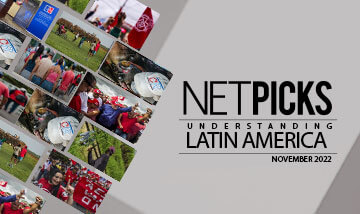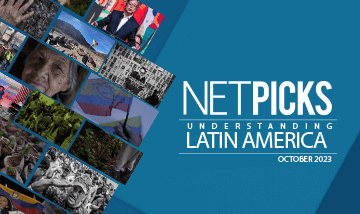Índice
- MOBILIZING PEOPLE POWER BEYOND ELECTIONS IN BRAZIL
- PARAMILITARY-STYLE GUARDS INSTILL FEAR IN WORKERS IN DOMINICAN CANE FIELDS
- SIXTY YEARS ON: RACHEL NOLAN ON COLOMBIA’S TRUTH COMMISSION REPORT
- SYMBOLIC REFUGEE PROTECTION: WHY LATIN AMERICA PASSED PROGRESSIVE REFUGEE LAWS IT NEVER MEANT TO USE
- Omar Hammoud Gallego and Luisa Feline Freier, October 6, 2022https://blogs.lse.ac.uk/latamcaribbean/2022/10/06/refugee-protection-latin-america-refugee-laws-never-used/
- ILLEGAL FISHING IN LATIN AMERICA – EXPERTS CONSIDER ANSWERS TO TOUGH QUESTIONS AT EVENT
Understanding Latin America
Dear readers and colleagues, this month we bring you five articles that reflect the reality of Latin America: one each from Brazil, Dominican Republic, Colombia one on failing refugee policies in Latin America and another on illegal fishing in the region.
- Mobilizing people power beyond elections in Brazil
- Paramilitary-Style Guards Instill Fear in Workers in Dominican Cane Field
- Sixty years on: Rachel Nolan on Colombia’s Truth Commission report
- Symbolic refugee protection: why Latin America passed progressive refugee laws never meant to use
- Illegal Fishing in Latin America – Experts Consider Answers to Tough Questions at Event
.
MOBILIZING PEOPLE POWER BEYOND ELECTIONS IN BRAZIL
Brazil’s Landless Workers’ Movement (MST) is hailed as one of the largest social movements in Latin America and one of the most radical. It’s known for its direct-action strategy of occupying unproductive land until their settlements are awarded official land titles. For more than three decades, they have worked with poor rural workers to fight for land access, agrarian reform and social justice. They have also long been supportive but critical of Brazil’s Workers’ Party (PT), the political party that Luiz Inácio Lula da Silva represents. This year, they not only backed Lula’s campaign, but ran candidates with PT for the first time. Of the 15 MST candidates, seven were elected. Editors at NACLA interviewed Cassia Bechara, a member of MST’s national board, for her opinion on the elections and the future of left mobilizing in Brazil – which is much more than just voting in a leftist president, she says. The future of the left in Brazil must involve defeating Bolsonarismo, referring to the former president Jair Bolsonaro, not the man himself but his whole neo-fascist, ultra-neoliberal, racist, misogynist project that he brought to Brazilian society, she says. Part of this will include strengthening institutions, reverting his political setbacks, confronting the power of the agriculture industry and making other deep structural changes. This interview was conducted and published before the elections at the end of October, and since then, many around the world have celebrated Lula’s victory. But they are also watching cautiously as events continue to unfold. Cassia and the MST have no doubt already began organizing. Read more bellow for their plans to pull the organized left out of its years-long depression.
NACLA staff, October 25, 2022
https://nacla.org/mobilizing-people-power-beyond-elections-brazil
.
PARAMILITARY-STYLE GUARDS INSTILL FEAR IN WORKERS IN DOMINICAN CANE FIELDS
In the Dominican Republic, one of the largest sugar exporters to the United States may be hiring paramilitary-style forces to threaten and control workers. Investigators at the Intercept tell the story of Flexi Bele, a Haitian sugarcane worker who has lived in the island for decades, and was suddenly evicted from his house one day by masked men carrying pistols and 12-gauge shotguns. The men were members of the private security forces hired by the export company Central Romana Corporation, where Bele used to worked. Similar violent evictions of workers have been reported from the Batey Lima camp, company housing owned by Central Romana. The security forces carrying out this dirty work, usually at pre-dawn hours, are described as an elite, Colombia-trained motorcycle force, who are often masked. Many of the sugarcane workers here are from Haiti – currently seeing a massive security and political crisis – who are living and working in the Dominican undocumented. This makes them vulnerable to wage theft, labor abuses, racial discrimination, and, now, violent evictions. A Central Romana spokesperson confirmed that this security force does exist, but denied mal intent, saying their sole reason for existing is to protect company property. But after speaking with several sugarcane workers, current and former Central Romana security guards, military officials and labor experts, the authors made different conclusions.
Sandy Tolan and Euclides Cordero Nuel, October 14, 2022
https://theintercept.com/2022/10/14/dominican-sugar-central-romana-fanjul-domino/
.
SIXTY YEARS ON: RACHEL NOLAN ON COLOMBIA’S TRUTH COMMISSION REPORT
If Colombia held a minute’s silence for every victim of its six-decade armed conflict, then no one would speak for the next seventeen years. This is the powerful opening by the author, Rachel Nolan, who gives a detailed and heartfelt analysis of Colombia’s peace process and the final report of the country’s Truth Commission. The war in Colombia, mainly between government forces, guerrilla groups and paramilitaries, has been the world’s longest lasting continuous conflict. Between 1985 and 2018, the worst years of the conflict, 450,664 people were killed, 90 per cent of them civilians. Over 121,000 people were also disappeared in that time span. The Truth Commission was born from the 2016 peace agreement, signed by the government of Colombia and the FARC guerrillas, as a way to acknowledge and repair some of the damages caused by the ongoing conflict. But the final report, says Nolan, goes beyond the historical and political. It does apportion blame, details certain atrocities, counts the dead and makes recommendations like decriminalizing drugs. But it also touches on the spiritual and psychological, as it includes reflections on the violence and its impact on society in general. This in depth look at the peace process also provides necessary context to understand the country’s massive social uprisings in 2021 and the importance of Gustavo Petro’s presidential victory earlier this year, as the country’s first left-wing president. Is Colombia actually on a new path? Rachel Nolan, October 20, 2020
https://www.lrb.co.uk/the-paper/v44/n20/rachel-nolan/sixty-years-on
.
SYMBOLIC REFUGEE PROTECTION: WHY LATIN AMERICA PASSED PROGRESSIVE REFUGEE LAWS IT NEVER MEANT TO USE
Latin American countries tend to have progressive and detailed refugee protection policies, at least in legislation. These range from free legal assistance in Nicaragua to the recognition of the right to refuge for people feeling environmental disasters in Ecuador. But most of these laws are not applied in practice. The authors try to answer why that is exactly. Looking at refugee policies in 19 Latin American countries over a 30-year period, they conclude that the legislation was mainly window dressing. It was passed to give the impression that something was being done about the issue, without any real plan about how to implement these ideas. This was the case throughout the 2000s, say the authors, when leftist governments in the region tried to morally position themselves against restrictive or oppressive policies and showcase their commitment to migrant rights, and human rights more broadly, by passing progressive refugee protection policies. But with no actually plan developed to carry out these policies, asylum systems became drastically underfunded and often ignored. This of course has had disastrous consequences as these countries have been unprepared to deal with the numerous migration crises in the region in recent years. So, are the policies still important?
Omar Hammoud Gallego and Luisa Feline Freier, October 6, 2022
https://blogs.lse.ac.uk/latamcaribbean/2022/10/06/refugee-protection-latin-america-refugee-laws-never-used/
.
ILLEGAL FISHING IN LATIN AMERICA – EXPERTS CONSIDER ANSWERS TO TOUGH QUESTIONS AT EVENT
Experts are increasingly concerned about what’s happening on the coast of Latin America and the Caribbean. In poor coastal villages, fishers are entering the drug trade, or, in areas like Ecuador and Costa Rica, intensifying their harvesting of sharks as bycatch. Chinese fishing fleets also continue to plunder South American waters. The illegal fishing industry, which has long been ignored or invisible, is finally gaining traction with researchers lately. This has not been an easy feat, as data from the high seas is sorely lacking and hard to get. Those at Insight Crime recently co-authored a paper and hosted a special panel on the topic with professors at the American University, and present some of their findings in this article. The consequences of illegal, unreported, and unregulated (IUU) fishing, say authors, are immediate and enormous. They damage livelihoods and marine ecosystems while facilitating other crimes, such as labor abuse and drug trafficking. There are several solutions, including increasing enforcement capacity and reining in bad actors, but also treating illegal fishing primarily as a problem of organized crime, not a problem of a lack of fishing regulation. Read more here about the severity of IUU fishing in the region, and what countries could be doing more to stop it – including the U.S.
Seth Robbins, September 12, 2022
https://insightcrime.org/news/iuu-fishing-top-experts-converge-tough-questions-event/





